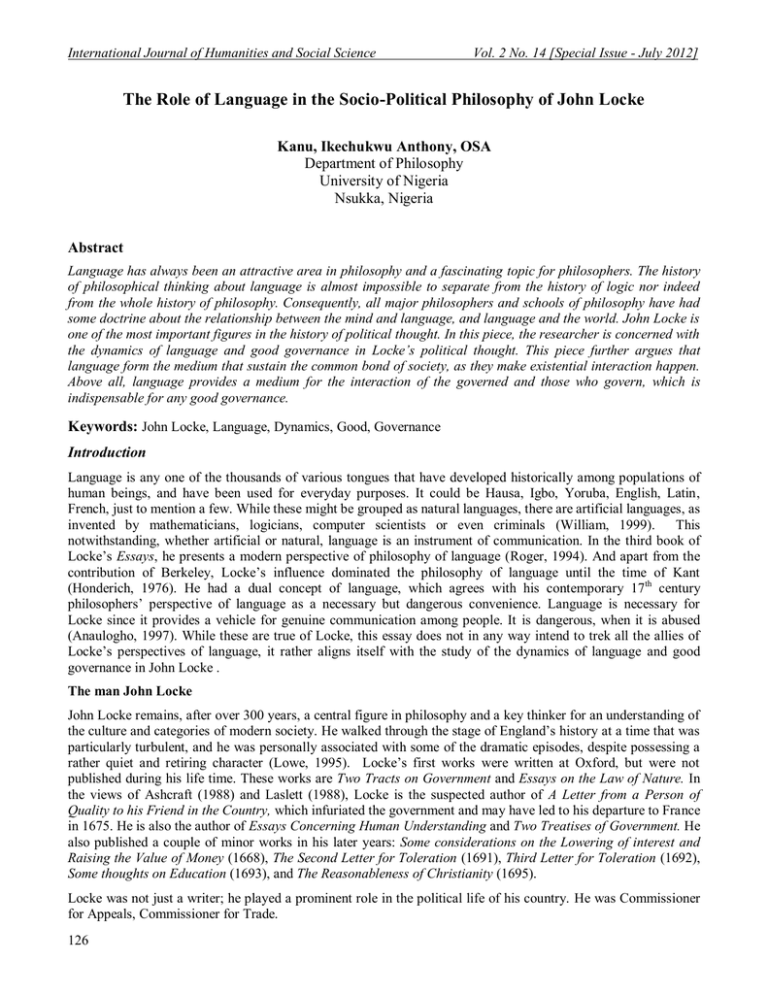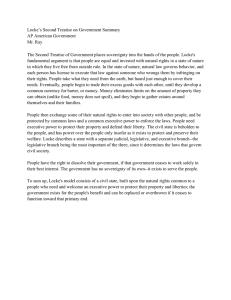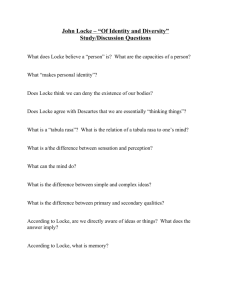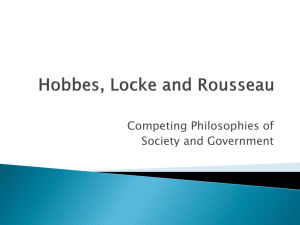Document 10464513
advertisement

International Journal of Humanities and Social Science Vol. 2 No. 14 [Special Issue - July 2012] The Role of Language in the Socio-Political Philosophy of John Locke Kanu, Ikechukwu Anthony, OSA Department of Philosophy University of Nigeria Nsukka, Nigeria Abstract Language has always been an attractive area in philosophy and a fascinating topic for philosophers. The history of philosophical thinking about language is almost impossible to separate from the history of logic nor indeed from the whole history of philosophy. Consequently, all major philosophers and schools of philosophy have had some doctrine about the relationship between the mind and language, and language and the world. John Locke is one of the most important figures in the history of political thought. In this piece, the researcher is concerned with the dynamics of language and good governance in Locke’s political thought. This piece further argues that language form the medium that sustain the common bond of society, as they make existential interaction happen. Above all, language provides a medium for the interaction of the governed and those who govern, which is indispensable for any good governance. Keywords: John Locke, Language, Dynamics, Good, Governance Introduction Language is any one of the thousands of various tongues that have developed historically among populations of human beings, and have been used for everyday purposes. It could be Hausa, Igbo, Yoruba, English, Latin, French, just to mention a few. While these might be grouped as natural languages, there are artificial languages, as invented by mathematicians, logicians, computer scientists or even criminals (William, 1999). This notwithstanding, whether artificial or natural, language is an instrument of communication. In the third book of Locke’s Essays, he presents a modern perspective of philosophy of language (Roger, 1994). And apart from the contribution of Berkeley, Locke’s influence dominated the philosophy of language until the time of Kant (Honderich, 1976). He had a dual concept of language, which agrees with his contemporary 17th century philosophers’ perspective of language as a necessary but dangerous convenience. Language is necessary for Locke since it provides a vehicle for genuine communication among people. It is dangerous, when it is abused (Anaulogho, 1997). While these are true of Locke, this essay does not in any way intend to trek all the allies of Locke’s perspectives of language, it rather aligns itself with the study of the dynamics of language and good governance in John Locke . The man John Locke John Locke remains, after over 300 years, a central figure in philosophy and a key thinker for an understanding of the culture and categories of modern society. He walked through the stage of England’s history at a time that was particularly turbulent, and he was personally associated with some of the dramatic episodes, despite possessing a rather quiet and retiring character (Lowe, 1995). Locke’s first works were written at Oxford, but were not published during his life time. These works are Two Tracts on Government and Essays on the Law of Nature. In the views of Ashcraft (1988) and Laslett (1988), Locke is the suspected author of A Letter from a Person of Quality to his Friend in the Country, which infuriated the government and may have led to his departure to France in 1675. He is also the author of Essays Concerning Human Understanding and Two Treatises of Government. He also published a couple of minor works in his later years: Some considerations on the Lowering of interest and Raising the Value of Money (1668), The Second Letter for Toleration (1691), Third Letter for Toleration (1692), Some thoughts on Education (1693), and The Reasonableness of Christianity (1695). Locke was not just a writer; he played a prominent role in the political life of his country. He was Commissioner for Appeals, Commissioner for Trade. 126 The Special Issue on Social Science Research © Centre for Promoting Ideas, USA www.ijhssnet.com He influenced the repeal of the Acts for the Regulation of Printing in 1695, and also the re-coinage of the debased English currency in the 1690’s. Before his death, Locke was not only an international renowned intellectual figure, he had moved in the most influential political circles in England (Iloyd, 1995). Born in August 29, 1632, Locke was the eldest child of a respectable Somersetshire Puritan family. His father was a small landowner, a lawyer and a captain of a volunteer regiment in the parliamentary army (Anaulogho, 1997). In spite of his family’s moderate income, Locke received an excellent education, first at Westminster School, where he received a thorough grounding in Latin and Greek; then in 1652, he went to Christ Church, Oxford. His association with the University of Oxford lasted for more than thirty years. He received his B.A degree in 1656, and graduated as Master of Arts in 1658. After his graduation, he remained at Oxford where he taught Greek, served as a reader in rhetoric and finally censor of moral philosophy in 1664 (Ilyod, 1995). He retained this position until he was expelled in 1684 at the instigation of Charles II, the reason being that Locke was involved with a political group that were opposed to the royal policies of the time (Lowe, 1995). Locke’s family had a very strong protestant background, accounting for the continuous influx of religion into his philosophy, and in fact dominated his analysis of gender equality. He was baptized into the Church of England. He had a very vast and long-lasting interest in religious matters: it never waned but continued until the day of his death. He had a great interest in biblical scholarship, Patristics and Anglican theology. After retiring from public life, he occupied himself with biblical studies and wrote a commentary on the Epistles of St Paul. Locke died in October 28, 1704, while Lady Masham was reading the Psalms to him. He was buried in the churchyard of the parish church at High Laver near Oats, where his tomb can still be seen (Anaulogho, 1997). Language and philosophy Language has always been an attractive area and a fascinating topic for philosophers. The history of philosophical thinking about language is almost impossible to separate from the history of logic and indeed the entire history of philosophy. All major philosophers and schools of philosophy have had some doctrine about the relationship between mind and language, and language and the world (Anaulogho, 1997). The earliest interaction between philosophy and language dates back to the ancient Greek philosophical era. Plato’s life-long battle against the Sophists is a typical example of this phenomenon. Plato attacked the Sophists because of their competent ability to twist language to their own advantage for the sake of making money (Omoregbe, 2003). He was infuriated by what he saw as the danger and threat that sophistry posed to genuine communication and life in the society (Pierer, 1992). Before Plato, the Sophists had dealt with linguistic and grammatical problems in a systematic way. Unlike Plato, they were not interested in the problem of language for theoretical purposes. They had a more urgent task to accomplish: to teach how to speak for the sake of political success and to win law suits (Anoughlogho, 1997). Language was the greatest instrument for political struggle in the Athens of the 5th century. Language became an instrument for definite, concrete and practical purposes. The Sophists believed that one had to manipulate language to his or her own advantage if such a person were to attain their objective. To enhance this purpose, the Sophists began a new branch of knowledge called rhetoric (Cassirer, 1976). As a result of their proficiency in rhetoric, they were able to make the weaker argument the stronger and to sweat-talk something bad into something good and turn black into white (Honderich, 1976). Furthermore, in the Plato’s dialogue: Cratylus, he considered another dimension of language: the question of whether the names of things were determined by convention or by nature. In this case, his analysis of language addressed the problem of nomenclature. He criticized conventionalism because it led to the bizarre consequence that anything can be conventionally denominated by any name. Hence, it cannot account for the correct or incorrect application of a name. He claimed that there was a natural correctness to names. To do this, he pointed out that compound words and phrases have a range of correctness. He also argued that primitive names had a natural correctness, because each phoneme represented basic ideas or sentiments. While Plato concerned himself with meaning, Aristotle, in his philosophy of language, stepped up his concern to issues of logic and categories. He separated all things into categories of species and genus. He believed that the meaning of a predicate was established through an abstraction of the similarities between various individual things (Wikipedia, 2012). The Stoics, in their philosophy of language, made important contributions to the analysis of grammar, distinguishing five parts of speech: nouns, verbs, appellatives (names or epithets), conjunctions and articles. 127 International Journal of Humanities and Social Science Vol. 2 No. 14 [Special Issue - July 2012] They also developed a sophisticated doctrine of the lektón associated with each sign of a language, but distinct from both the sign itself and the thing to which it refers. This lektón was the meaning (or sense) of every term. The lektón of a sentence is what we would now call its proposition. Only propositions were considered "truthbearers" or "truth-vehicles" (i.e., they could be called true or false) while sentences were simply their vehicles of expression (Wikipedia, 2012). Medieval philosophers were greatly interested in the subtleties of language and its usage. This interest was provoked by the necessity of translating Greek texts into Latin. Furthermore, the scholastics of the high Medieval Period, such as Occam and John Duns Scotus, considered logic as the science of language (scientia sermocinalis). Following the contributions of the linguists of the Renaissance and Baroque periods, such as Johannes Goropius Becanus, Athanasius Kircher and John Wilkins, Locke in the 17th century, like Plato, dealt with the fact that only an adequate or correctly formed language could be a vehicle for communication. He believes that the desire to know reality is the foundation of communication. Even though there is the possibility of lying, Locke argues that lies do not constitute communication, since to lie is to deny reality. To lie is the perpetration of inequality in society since it denies the other his or her share and portion of reality. To deceive a person is an implicit assumption that he or she is not worthy to know the truth (Wikipedia, 2012). This explains why Locke, like Plato condemned sophistry. Nor has this mischief stopped in logical Niceties, or curious empty speculations; it hath invaded the great concernment of human life and society; obscured and perplexed the material truths of law and divinity; brought confusion, disorder and uncertainty into the affairs of mankind; and if not destroyed, yet in great measure rendered useless, those two great rules, religion and justice. (p. 486). In the early 19th century, the Danish philosopher Søren Kierkegaard insisted that language ought to play a larger role in Western philosophy. He argues that philosophy has not sufficiently focused on the role language plays in cognition and that future philosophy ought to proceed with a conscious focus on language: Hence, language began to play a central role in Western philosophy in the late 19th century. The philosophy of language then became so pervasive that for a time, in analytic philosophy circles, philosophy as a whole was understood to be a matter of philosophy of language. In the 20th century, "language" became an even more central theme within the most diverse traditions of philosophy. The phrase "the linguistic turn" was used to describe the noteworthy emphasis that modern-day philosophers put upon language (Wikipedia, 2012). The Lockean concept of good governance In Locke’s political philosophy, the state of nature is the first stage in the process of transition into civil society. The state of nature with all its inadequacies creates the need for a political society. This need speaks of the inadequacies of the state of nature, which creates the appetite for anticipating a good system of governance in the civil society. Moving from a state of nature where individuals are not subject to common legitimate authority with the power to legislate or adjudicate disputes, Locke stresses the dynamics of individual consent as the mechanism for forming the civil society. Locke (1999) writes, “Men being, as has been said, by nature all free, equal and independent, no one can be put out of this state, and subjected to the political power of another, without his own consent” (p. 142). The first process of transition, leads to the formation of the community, where each person agrees to surrender individual control over their executive power of the law of nature in exchange for an equal share, along with the other contractors, in the joint control of everyone’s pooled executive power of the law of nature. As such, the executive power of the law of nature is de-privatized (Iloyd, 1995). The formation of the community only takes us half way into the formation of the political society. It is thus an intermediate state between the state of nature and the civil society. It is not yet a state because there is no formally constituted body which has the authority to legislate and enforce the law. The formation of the community leaves things incomplete and calls for a second stage in order to establish a civil society. This involves the formulation of a formally constituted authority to exercise the collective executive power of the state of nature. It should be noted that the entrustment of their executive power is not to individual persons, but to a constitutional form. The constitutional form would help people identity those who hold political power with right. By majority decision, the members of the community entrust their collective executive powers of the law of nature into the hands of a constitutional form of government, and thus, the state is created (Iloyd, 1995). 128 The Special Issue on Social Science Research © Centre for Promoting Ideas, USA www.ijhssnet.com For the constitutional form of government to run a system to be ascribed as good in Locke, certain values are indispensable. For Locke, justice and moral goodness are indispensable variables for good governance. For this reason, the violation of treatises, political assassinations and unjust war are inimical to good governance (Maritain, 1985). Good governance must show itself in the government’s ability to create a bond that is teleological, ontological, affective, moral, organisational and communicative (Messner cited by Anaulogho, 1997). Good governance should be able to create a society where people are responsible for one another as well as towards the community as a whole. This moral responsibility gives rise to the affective bond of the community. The Lockean great principle of morality is, “to do as one would be done to” (Locke, 1999). The reason why people unite themselves under a civil society, is to preserve their property. By property he means lives, liberties and estates (Locke, 2003). And thus for a government to be good, it should be able to protect property, and punish people who go against the preservation of property. If the purpose of the civil society is to be attained, people must come together and be bound by a common factor. This is where the relevance of language comes in as an ingredient for good governance. The role of Language in the Socio-political Philosophy of John Locke Having established that good governance is attained with the realization of the ends of the civil society, and that the civil society cannot be formed unless people come together and are held together by a bond that would enhance this unity, the significance of language in Locke’s political theory cannot be overemphasized. Language in Locke is the bond of society. It is therefore not surprising that Locke fought a fierce battle against the abuses of language, for an abuse of language could cripple the politic. Language makes existential interaction possible, and to corrupt it would lead to the corruption of human society and existence (Anaulogho, 1997). Aristotle (1962) argued that man is by nature a political animal. By this he means that man is meant to live in a society, and thus a social being. One of the evidence of this is the gift of language that man has; for nature does nothing in vain. It is only in the society that the gift of language has any meaning, and anyone who is unable to live in a society, Aristotle argues is “either a beast or a god” (p. 28). From this, we begin to understand the influence of Aristotle on Locke’s philosophy of language. Locke beliefs that God endowed mankind with the gift of language for both the improvement of knowledge and the maintenance of society; as man is naturally inclined to live in the society, so also is he furnished with language to interact with his fellow human beings in that society. For a society without interaction is no society at all. Locke (2003) writes. God having made man such a creature, that in his own judgement it was not good for him to be alone, put him under strong obligations of necessity, convenience, and inclination, to drive him into society, as well as fitted him with understanding and language to continue and enjoy it. (p. 133). Thus, language becomes a means of preserving and enjoying the society in which he or she lives. The political society is a world of human beings and thus a world of communication. The consciousness of human beings in the political society is that of intentionality; we think, we speak and we act. Just as there is no such thing as isolated human beings, here is also no such thing as isolated thinking. Every act of thinking requires a subject who thinks, an object thought which mediates thinking and subjects who express themselves in linguistic signs. The thinking subject cannot think alone, for in the act o thinking, the thinker co-participates with other subjects. There is no longer “I think” but “we think” (Freire, 1990). Language thus becomes a unifying factor and a means through which appropriate authorities transmit the constitution of the state. Language is thus the instrument of interaction between the government and the governed, and a binding force of society; without this interaction between the leader and the led and among the led, one cannot talk about the existence of good governance. Evaluation and conclusion Locke’s concept of language as an instrument of communion in the political society is relevant to any political or social discussion. Although some scholars like Toynbee have denounced attempts to infer nationality from language, it is also obvious that language has been invoked more than any other variable as a criterion for national construction (Rustov, 1972). The recurrentness of language in discourses regarding nation building is as a result of the fact that language doesn’t divide a people, it rather unites. People who have the same language are able to live more together than when they have different languages. This is evident in countries that were divided into patchworks by their colonial masters, bringing together people not related by language or culture into one country, the end results like in Nigeria has been division and lack of unity of purpose. 129 International Journal of Humanities and Social Science Vol. 2 No. 14 [Special Issue - July 2012] Politics and political parties in Nigeria are still divided along language lines: Igbo, Yoruba and Hausa. There is more allegiance to language and tribe than the nation (Achebe, 1984). This is not to say that language is the only criterion for national unity, because language is not fixed: politics shapes language as much as language shapes politics. While language might not be the primary criterion for national unity, its socio-political significance cannot be ignored. Life in the human society is life with and by means of the language human beings share with one another. An understanding of language is therefore indispensable for the understanding of human society. And it is an indispensable tool for political construction and reconstruction. We speak about innumerable matters that are not present at all in the face-to-face situation, including the past which we may not have directly experienced or the future which we may never experience. This is why Berger and Luckmann (1991) argue that language is capable of becoming the objective repository of vast accumulations of meaning and experience, which it can then preserve in time and transmit from one generation to another. It is in this regard that Locke’s concept of language as the bond of political society cannot be undermined. References Achebe, C. (1984). The trouble with Nigeria. U. S. A: Heinemann. Alex, T. (2012). Locke’s political philosophy. In Stanford Encyclopaedia of Philosophy. Retrieved February, 2012. http://plato.stanford.edu/entries/locke-political. Anaulogho, M. (1997). The Equality of Mankind According to John Locke. Phd. Dissertation, Gregorian University Rome. Aristotle (1962). Politics. Middlesex: Penguin Classics. Ashcraft, R. (1988). Revolutionary politics and Locke’s two treatise of government. Princeton: Princeton University Press. Berger, P. and Luckmann, T. (1991). The social construction of reality: A treatise in the sociology of knowledge. London: Penguin Books. Cassirer, E. (1976). An essay on man: An introduction to a philosophy of human culture. New haven: Yale university Press. Freire, P. (1990). Education for critical consciousness. London: Sheed and Ward. Honderich, T. (1976). The Oxford Companion to Philosophy. England: Penguin Books. Iloyd, T. (1995). Locke on government. London: Routledge. Laslett, P. (1988). Introduction to Locke, two treatises of government. Cambridge: Cambridge University Press. Locke, J. (1999). Essays concerning human understanding. Pennsylvania: Pennsylvania University Press. Locke, J. (2003). The two treatises of government. London: Yale University Press. Lowe, E. J. (1995). Locke on human understanding. London: Routledge. Omoregbo, J. (2003). A simplified history of western philosophy: Ancient and medieval philosophy. Lagos: Joja Educational Research and Publishers. Pierper, F. (1992). Abuse of language, abuse of power. San Francisco: Ignatius Press. Plato (360 BC). Cratylus. Retrieved 25th April, 2012. C. 390. http://classics.mit.edu/Plato/cratylus.html Rogers, G. A. J. (1994). Locke’s philosophy: Content and context. Oxford: Clarendon. Rustov Dankwart (1972). Nation. In S. David (Ed.). International Encyclopaedia of Social Sciences (pp. 9-13). New York: Macmillan. Wikipedia (2012). http://en.wikipedia.org/wiki/Philosophy_of_language. Retrieved 20th March 2012. William, G. L. (1999). Philosophy of language. In R. Audu (Ed.). The Cambridge Dictionary of Philosophy (pp.673-676). Cambridge: Cambridge University Press. 130







